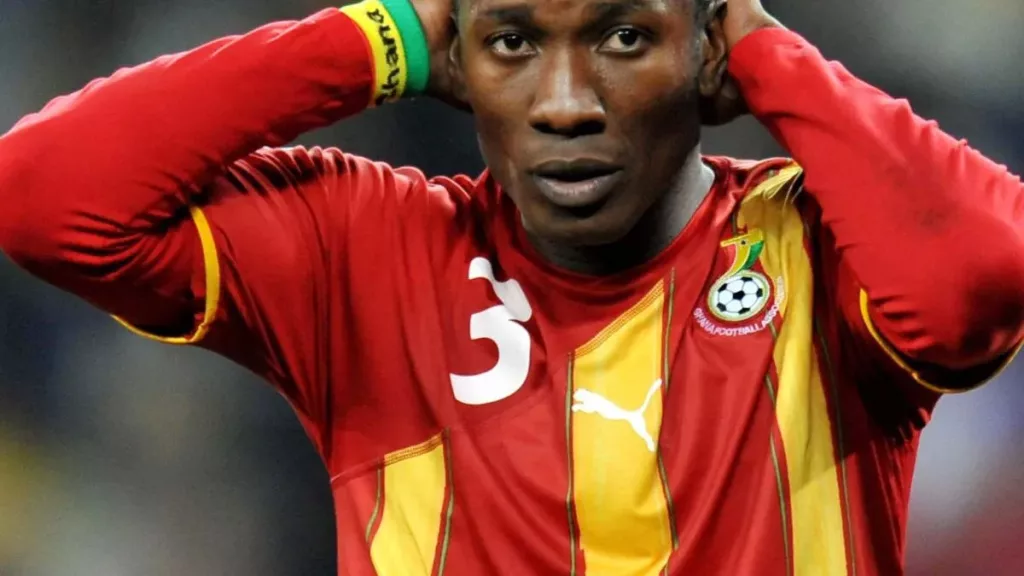Ghana’s Saga: From Azumah’s Uppercuts to Gyan’s Miss –the Search for Ghana’s Next Hero
As the sun set on the Ghana of the 1990s and early 2000s, it cast long shadows of figures larger than life. The newscasters of my youth, with voices deep and commanding, didn’t just report events; they were the pulse of a nation brimming with pride. Abedi Pele’s graceful command of the football, Kofi Annan’s diplomacy weaving through global politics, and Azumah Nelson’s fists that spoke of resilience — they were not just heroes; they were Ghana’s beating heart. During the colonial period, Ghana’s soul was stirred by the likes of Yaa Asantewaa, a matriarchal figure of might and resolve, who stood defiant against British rule, her legacy a testament to the enduring spirit of resistance. This spirit cascaded down to the architects of independence, with Kwame Nkrumah and J.B. Danquah at the helm, steering the Gold Coast into a new dawn as the sovereign nation of Ghana.
The echoes of their struggle reverberated through the decades, inspiring mass protests and the youth of the era, who would one day assume the mantle of leadership themselves or pass it on to their progeny. Yet, the current leaders, descendants of those once valiant fighters, seem to stand at a remove from the fervent ideals of their forebears. The once blazing torch of patriotism and selflessness appears dimmed in the hands of some who navigate the corridors of power today, prompting a collective yearning for a return to the ethos that once defined the nation. Fast forward to today, from a place not bordered by the familiar horizons of Accra but by the sprawling expanse of a foreign land, I feel the distance from those golden days. The reverence that once surrounded our heroes has waned, replaced by a cloud of disenchantment as economic hardships compel many to seek greener pastures abroad, myself included.
Reflecting now, the 2006 World Cup qualification was a crescendo of national unity; it was as if each victory on the pitch healed a part of our collective psyche. We revelled in the emergence of heroes who carried our flag with such vigour. Yet, Asamoah Gyan’s missed penalty in 2010 felt like a sudden jolt from a beautiful dream. While it was but a moment in a game, it seemed to mirror a larger narrative within Ghana — the dwindling emergence of figures that stir the soul of the nation. It’s a poignant reminder of the ebb and flow of heroism in our cultural consciousness. Intriguingly, this moment can be seen as a metaphor for the nation’s contemporary struggle to cultivate new heroes. Just as Gyan’s penalty miss was an unexpected turn in a narrative of victory, Ghana’s journey has been punctuated by moments of promise that have yet to fully crystallize into the emergence of new, unifying figures of admiration and national pride. This poignant parallel between a sporting event and the socio-political fabric of a nation offers a rich vein for exploration in the broader context of the article.

The heroes of Ghana’s past now linger as faint whispers from a time when their valour and sacrifice resonated deeply with a nation’s soul. These figures once stood as pillars of hope and unity, their stories a symphony that inspired a generation to dream of greatness. Yet, today, their presence feels more like shadows than substance, a hollow echo in a reality grappling with dissonance and disillusionment. The Year of Return, though a powerful initiative to reconnect with roots, somehow amplifies this sense of loss for those within Ghana’s borders. It’s as if the celebration of return for the diaspora underscores the departure of something intrinsic—a sense of belonging, of shared destiny—that once was taken for granted. This psychological chasm has widened with the socio-economic challenges that prompt the youth to look beyond Ghanaian shores for fulfilment and opportunity, further eroding the feeling of connection to the land that once nurtured their forefathers’ dreams.
As this generation looks around, the heroes they seek appear distant, and the legacy of past glories cannot mask the yearning for present-day champions. It begs the question: how has Ghana, rich in history and accomplishment, arrived at a point where the triumphs of yesteryear seem insufficient to galvanize the present? The answer may lie in the complex weave of memory and reality, expectation and experience. The psychological journey from independence to now has been one of navigating between the pride of past achievements and the pressing demands of current circumstances. As the world has advanced, perhaps Ghana has struggled to keep the essence of its identity at the forefront, leading to a sense of drifting from the very ideals that once defined it.
This probe into Ghana’s current state is not merely a reflection but a call to rekindle the spirit of those who came before—to draw from the well of history not just for nostalgia but for the sustenance needed to forge a new path of heroism tailored for today’s Ghana. The present socio-economic fabric of Ghana is woven with threads of uncertainty. The youth, once buoyant with hope and political zeal, now watch with wearied eyes as the promises of change are buried under the weight of corruption and self-interest. The political landscape, marred by scandal and inertia, stands in stark contrast to the days when leaders were symbols of integrity and progress.
As the call for heroes goes out, it is not just a whisper for a return to past glories but a roar for the emergence of new champions. We need artists who can tell the story of Ghana not with melancholy but with the brushstrokes of innovation. We need athletes whose triumphs are not personal accolades but victories for the nation. We need politicians who serve not for applause but for impact. This plea for heroes is an invocation for action — an action that binds the dreams of individuals to the aspirations of our nation. It is a testament to the indomitable spirit of Ghana, a spirit that refuses to be quelled by adversity. As the first part of our reflection closes, we know the heart of Ghana still beats strong, ready to inspire and be inspired, yearning for a future where heroes arise not just from the annals of history but from the very soil of our collective endeavour.
We stand on the cusp of change, where the potential of a new generation of heroes can redefine the narrative of Ghana — a narrative that must be authored by the many, not the few. It is a time for new stories, new legends, and new heroes. The echoes of the past have laid the groundwork; now, it’s our turn to build upon it and rise, not just to answer the call but to become the call itself — for Ghana, for glory, for the future. In this era where the silhouette of Ghana’s former heroes casts a long shadow over its present, we must turn our gaze to the future, to the heroes in waiting. The socio-economic landscape of Ghana today is not barren; it is ripe with the seeds of potential that, if nurtured, can grow into the icons of tomorrow.
The heroes we seek need not be giants of old; they can be the teacher whose dedication forms the minds of the next leaders, the local entrepreneur whose innovation uplifts a community, or the young activist whose passion ignites a movement for change. They are the healthcare workers who, amid a global crisis, have shown resilience and compassion without the promise of parades. Our socio-economic challenges – the unemployment, the inflation, the cedi’s fluctuation – are not just hurdles to overcome but platforms for heroes to rise. Economic adversity has often been a crucible for greatness. It is in the heat of such trials that true heroes are forged, their mettle tested, their resolve crystallized. As we stand today, the yearning for heroes is more than nostalgia; it is a clarion call for us to embody the virtues we seek. The potential for heroism lies dormant in each of us, waiting for the spark of circumstance to ignite it. We must be the heroes we long for – leading by example, embodying the values of integrity, innovation, and patriotism.
The story of Ghana, marked by a tide of unfulfilled promises by the political class, has left many feeling disillusioned and heartbroken. The image of a leader clad in a three-piece suit amidst the sweltering tropical heat, growing portly in a show of affluence, has become a symbol of mistrust for the populace. This disconnect has driven the youth to seek futures elsewhere, leaving behind the land that once nurtured bold dreams. But our narrative is not destined to end in despair. It is a call for us to forge a new path with our actions, to embody the heroism that pulses in every Ghanaian heart. Let’s look forward, not with regret, but with determination to cultivate a nation of heroes, redefining Ghana’s mark on the world. Together, we rise—not as a chorus of the disenchanted, but as architects of a new dawn for Ghana.

